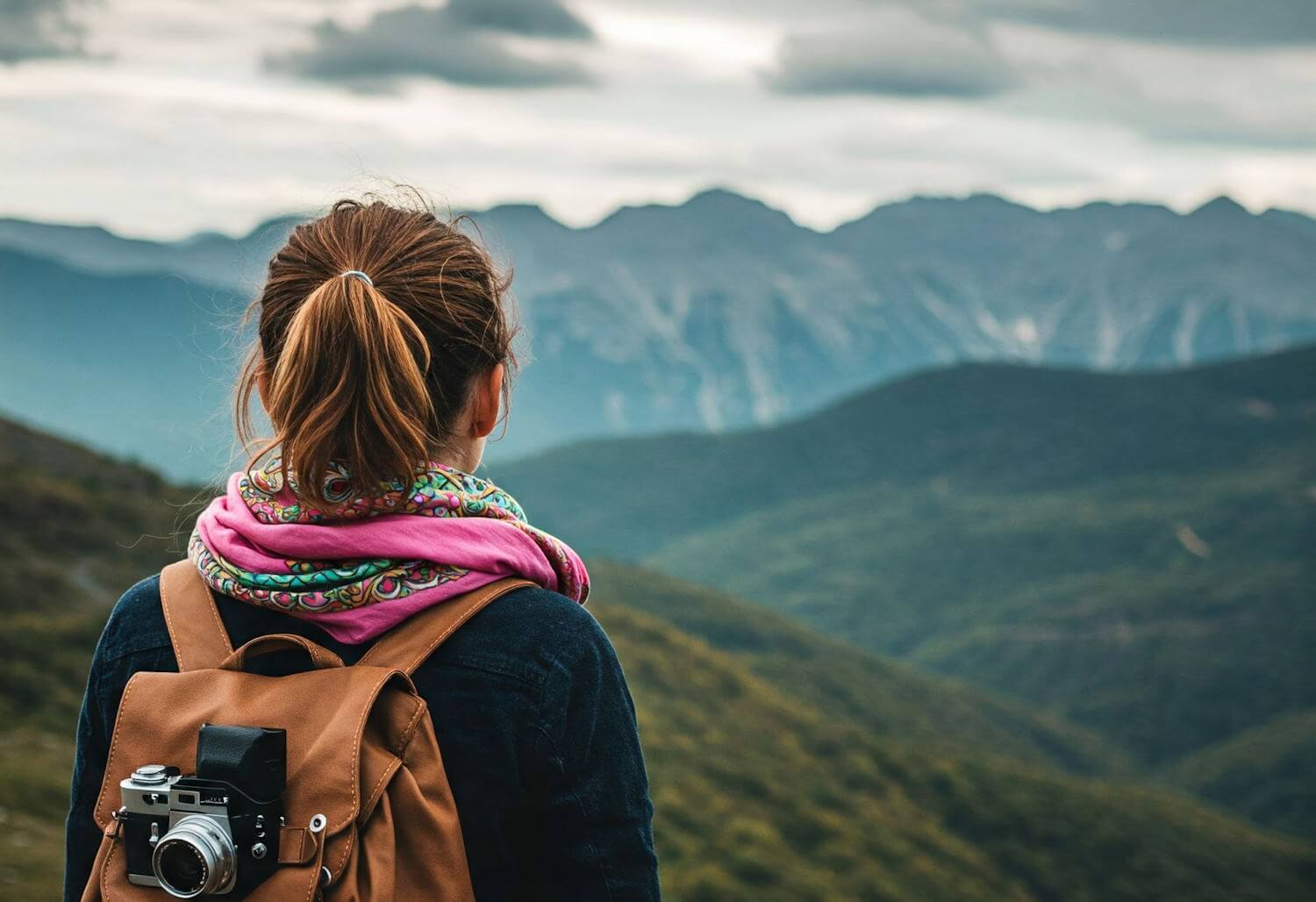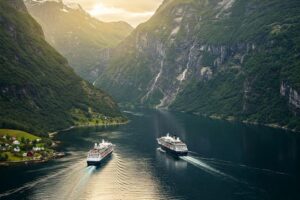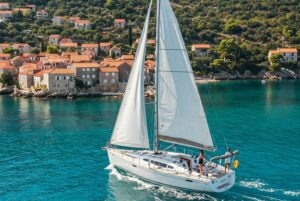Introduction to the Balkans
The Balkans, located in Southeast Europe, comprise a diverse array of countries and cultures, each boasting its own history, traditions, and landscapes. Often subject to misconceptions and underappreciation, this region is frequently overlooked by travelers in favor of more popular European destinations. However, the Balkans offer a unique opportunity for backpackers to immerse themselves in experiences that are both enriching and memorable.
This geographical area features a stunning variety of natural landscapes, ranging from rugged mountains and pristine lakes to sun-kissed beaches along the Adriatic Sea. The natural beauty found in the Balkans is complemented by an abundance of outdoor activities, appealing to adventurers of all kinds. From hiking in the Durmitor National Park in Montenegro to navigating the diverse trails of Triglav National Park in Slovenia, the options for exploration are substantial.
Beyond its picturesque scenery, the Balkans are steeped in historical significance. This region has been at the crossroads of various civilizations, leading to a rich tapestry of cultural influence. Ancient ruins, medieval fortresses, and Ottoman-era architecture can be found throughout the landscape, offering a glimpse into the past. Cities such as Sarajevo and Belgrade showcase this blend of history, where modern life thrives alongside centuries-old traditions.
Moreover, the vibrant local cultures contribute to the overall charm of the region. Each country within the Balkans has its own language, culinary heritage, and customs, inviting travelers to engage with local communities. Festivals, traditional music, and folk dances offer an authentic experience that enriches the backpacker’s journey. As visitors traverse this fascinating area, they will discover not only stunning sights but also the warmth and hospitality of the people. This cultural immersion serves as a testament to the vibrant livelihoods that thrive in the region.
Choosing the Right Destinations
Backpacking through the Balkans presents a unique opportunity to experience destinations that often remain under the radar. Choosing the right places to visit is crucial for an enriching travel experience. Underrated destinations in this region offer authentic cultural interactions, breathtaking landscapes, and historical significance, making them worthy of exploration. Albania, Montenegro, and North Macedonia stand out as remarkable locations that promise adventure and discovery.
Albania, with its stunning coastline along the Adriatic and Ionian seas, is becoming increasingly popular among travelers seeking a blend of sun and exploration. The Albanian Riviera is adorned with quaint beaches and charming towns such as Dhërmi and Himara, where visitors can experience the local lifestyle while enjoying fresh seafood. Furthermore, Albania’s capital, Tirana, showcases a rich mix of architectural styles and a burgeoning culinary scene, offering affordable accommodation options that appeal to the budget traveler.
Montenegro, often overshadowed by its neighbors, is home to some of the most picturesque landscapes in Europe. The UNESCO World Heritage site of Kotor draws visitors with its stunning fjord-like bay and medieval architecture. The country’s national parks, such as Durmitor and Biogradska Gora, present ample opportunities for hiking, rafting, and connecting with nature. These natural wonders combined with the affordability of Montenegro make it an ideal choice for adventurous backpackers.
North Macedonia is uniquely positioned as a cultural melting pot, boasting rich archaeological sites and vibrant urban centers. The capital, Skopje, offers an intriguing mix of old and new, showcasing historical monuments along the Vardar River. The serene beauty of Lake Ohrid, a UNESCO World Heritage site, presents an ideal spot for relaxation and exploration, with outdoor activities such as hiking and swimming readily available. These lesser-known spots are not only accessible but also provide experience-rich opportunities, enhancing the backpacking journey through the Balkans.
Planning Your Itinerary
Creating a well-structured itinerary is essential for backpacking through the Balkans, as this diverse region offers a wealth of experiences across its many countries. Consider starting by identifying the specific destinations you wish to visit, ensuring that they align with your personal interests and travel goals. Popular spots such as Sarajevo, Dubrovnik, and Kosovo’s cities provide a blend of cultural, historical, and natural attractions that are emblematic of the region.
Travel times between these destinations can vary significantly, so it’s important to research transportation options. Buses are a common mode of travel within the Balkans, often being both economical and effective. Train services are also available, but they may not connect all desired locations. Ensuring that your itinerary allows ample travel time can help prevent stress and maximize the enjoyment of each stop. Aim to allocate a few days in major cities, allowing time to explore their surroundings and local cultures.
Seasonality plays a crucial role in planning your trip. The Balkans typically experience a Mediterranean climate, with summer being a peak time for tourism due to favorable weather. However, spring and early autumn can offer a less crowded experience, providing opportunities to engage with the landscape and local communities in a more intimate setting. Consider visiting iconic landmarks, such as the ancient city walls of Dubrovnik or the picturesque lakes of Plitvice National Park.
In addition to the must-see sites, include unique experiences in your itinerary, such as a home-cooked meal in a family-run guesthouse or participation in local festivals. These encounters will enrich your backpacking journey and create lasting memories. Careful planning enables travelers to appreciate the Balkans’ beauty while creating a well-rounded and fulfilling travel experience.
Accommodation Options
The Balkans offer a variety of accommodation options for backpackers, ensuring that every traveler finds a suitable stay that balances comfort and budget. One of the most popular choices among backpackers remains hostels, which can be found in almost every city and town across the region. These hostels not only provide affordable lodging but also foster a communal atmosphere, allowing travelers to connect with fellow explorers. The presence of shared common areas and organized events often enhances the cultural exchange experience, making it a rewarding choice for those seeking social interactions.
For those looking for a more intimate experience, guesthouses provide a welcomed alternative. Typically family-run, these establishments not only offer cozy lodgings but also an opportunity to connect with locals. Wandering the beautiful streets of towns such as Kotor or Plovdiv, guests can find charming guesthouses that often serve traditional meals, giving backpackers a taste of local culture. Staying in a guesthouse can also provide practical insights into the region’s customs and practices, which can greatly enrich your overall travel experience.
Camping is another viable accommodation option for adventurous backpackers in the Balkans. The region boasts an array of stunning natural landscapes, from rugged mountains to tranquil lakes, making it ideal for those who wish to immerse themselves in nature. Various campsites are available, ranging from basic to more developed facilities with amenities such as showers and cooking areas. Furthermore, camping can provide a unique opportunity to witness the breathtaking sunsets and starry skies that are prevalent in these less-traveled regions.
Ultimately, the Balkans are equipped with diverse accommodation choices that cater to all types of backpackers, each contributing to an enriched cultural journey. Whether one opts for a lively hostel or a peaceful campsite, these lodging options ensure an excellent balance between comfort and local hospitality, paving the way for memorable experiences in the Balkans.
Culinary Delights and Local Cuisine
The Balkans boast a rich culinary heritage that reflects the diverse cultures and traditions of the region. As backpackers traverse these lands, they will encounter a tapestry of flavors shaped by centuries of history and local ingredients. Traditional dishes vary from country to country, yet many share common elements, offering travelers an interconnected experience through food.
One of the most beloved Balkan dishes is ćevapi, a grill-based specialty comprised of minced beef, lamb, or pork formed into small, sausage-like pieces. Found at street stalls and restaurants alike, these savory delights are often served with somun (a type of flatbread), chopped onions, and a tangy red pepper condiment called ajvar. Sampling ćevapi not only satisfies hunger but also connects one with local culinary customs.
Another staple in the region is sarma, which consists of pickled cabbage leaves stuffed with a mixture of meat and rice. Each country offers its unique twist on the preparation, allowing backpackers to experience local variations. Similarly, dishes like moussaka, a baked casserole featuring layers of eggplant, potatoes, and meat, highlight the Mediterranean influence that permeates the Balkans.
As travelers navigate bustling markets or cozy family-run eateries, they will also encounter an array of street food. Options such as burek, a flaky pastry filled with meat, cheese, or vegetables, are not to be missed. Accompanying these offerings are regional beverages like rakija, a fruit brandy that serves as a warm welcome in many households.
Food plays an integral role in the cultural experience of the Balkans, inviting travelers to engage with locals and partake in their traditions. By exploring the culinary landscape, backpackers not only indulge in flavorful dishes but also create lasting memories rooted in the vibrant culture of the Balkans.
Outdoor Adventures and Activities
The Balkans are a treasure trove of outdoor activities that cater to adventure enthusiasts. With their diverse landscapes, ranging from rugged mountains to serene lakes, the region offers numerous opportunities for exploration and enjoyment. One of the key activities for backpackers is hiking. The Balkans boast an extensive network of hiking trails, many of which provide breathtaking views and access to some of the most stunning natural scenery in Europe.
A standout hiking destination is the Durmitor National Park in Montenegro. Here, visitors can embark on trails that lead to the park’s impressive glacial lakes and rugged peaks. The Bobotov Kuk trail is particularly popular, offering a challenging hike that culminates in spectacular panoramic views. Another excellent choice is the Rila National Park in Bulgaria, home to the Seven Rila Lakes, where trekkers can marvel at the picturesque alpine landscape while enjoying the fresh mountain air.
In addition to hiking, swimming in natural lakes is another memorable experience for backpackers in the Balkans. The clear, pristine waters of Lake Ohrid, straddling the border between North Macedonia and Albania, provide a perfect setting for a refreshing dip. This UNESCO World Heritage site is not only known for its stunning beauty but is also rich in biodiversity, making it ideal for nature lovers.
For those interested in exploring the great outdoors further, various national parks such as Plitvice Lakes in Croatia and Sutjeska in Bosnia and Herzegovina provide ample opportunities for wildlife spotting, photography, and camping. These parks offer well-maintained trails and facilities to accommodate both seasoned trekkers and casual day-hikers. Overall, the outdoor adventures available in the Balkans present a perfect blend of thrill and natural beauty, inviting travelers to immerse themselves in the breathtaking wilderness of the region.
Cultural Experiences and Local Etiquette
Engaging with the local culture is an essential aspect of backpacking through the Balkans. As travelers venture through this diverse region, it is crucial to understand the various customs and traditions that shape the experiences of local residents. Respecting these cultural nuances not only enriches one’s travel experience but also fosters deeper connections with the communities encountered along the journey.
One effective way to connect with the local culture is by participating in traditional events and festivals. The Balkans host numerous celebrations throughout the year that showcase regional customs, music, and dance. Events such as the Kolo festival in Serbia or the Dijaspora Festival in Bosnia and Herzegovina provide opportunities to engage with locals, learn more about their heritage, and enjoy vibrant performances. Travelers should consider timing their visits to coincide with these festivities, as they often offer insights into the region’s history and social values.
Additionally, understanding local etiquette is fundamental when interacting with residents. Simple gestures, such as greeting people with a smile or saying “Dobar dan” (Good day) in the local language, can go a long way in building rapport. It is also important to respect different dining customs; for instance, being invited to someone’s home often entails bringing a small gift, such as flowers or sweets, as a token of appreciation. Moreover, while visiting places of worship, dressing modestly and observing specific rules is essential to show respect for the spiritual significance these sites hold for the community.
Furthermore, indulging in local arts and music forms a vital part of the cultural experience. The Balkans are renowned for their rich musical heritage, from traditional folk songs to contemporary performances. Attending local concerts or exploring galleries featuring regional artists can offer valuable insights into the cultural fabric of this diverse area. By actively engaging with the culture and customs during their travels, backpackers can create meaningful memories and contribute positively to the communities they visit.
Travel Tips and Safety Precautions
Traveling through the Balkans can offer a rich tapestry of culture and breathtaking landscapes. However, to navigate this region effectively and safely, it is essential to be prepared. A critical first step is understanding the various transportation options available. The Balkans boast a mix of trains, buses, and shared taxis, allowing travelers to choose according to their budget and comfort level. In cities, public transportation is often efficient, but it is beneficial to check local schedules and routes ahead of time to avoid confusion.
Language can pose a barrier in some areas, as not all locals speak English fluently. Learning a few basic phrases in the local language can facilitate better communication and endear travelers to residents. It may be helpful to download translation apps or carry a pocket phrasebook. Being respectful and attempting to communicate in the local language can enhance the travel experience and build rapport with locals.
While the Balkans are generally safe, travelers should remain vigilant and aware of their surroundings. Petty crime, such as pickpocketing, can occur in crowded areas and tourist hotspots. To mitigate these risks, it is advisable to keep valuables secure, ideally in a money belt or hidden pouch. When venturing into less populated areas, consider traveling with a group, as this is often safer than exploring alone.
Health considerations should also feature prominently in travel planning. It is essential to have appropriate travel insurance that covers any medical emergencies. Familiarize yourself with local health care facilities and know how to reach them. Additionally, carrying a small first aid kit can prove beneficial, especially for minor injuries or ailments while on the road.
By integrating these travel tips and safety precautions into your itinerary, you can enhance your experience in the Balkans and ensure a smooth and secure adventure.
Conclusion: Embrace the Unexpected
Backpacking through the Balkans offers travelers an opportunity to explore a region rich in culture, history, and stunning landscapes, often overlooked in favor of more mainstream travel destinations. The unique charm of the Balkans lies in its underrated locations that invite curiosity and adventure. From the quaint villages and rugged mountains of Montenegro to the historical treasures of Bosnia and Herzegovina, every stop along the way has its distinctive flavor and experiences waiting to be discovered.
Engaging with these lesser-known destinations fosters a sense of spontaneity, allowing one to connect intimately with the local way of life. In the Balkans, you’ll find hospitable locals eager to share their stories, homemade delicacies, and traditions that have been passed down through generations. By embracing the unexpected in your travels, you may stumble upon hidden gems—be it a serene lakeside, a vibrant street market, or a breathtaking natural monument that wouldn’t typically make it onto a well-trodden itinerary.
As you plan your backpacking adventure, consider stepping beyond the conventional boundaries of tourism. Allow yourself the freedom to meander through charming alleyways, engage in conversations with residents, and take the road less traveled. Such experiences are not only enriching but help cultivate a deeper understanding of the region’s diverse heritage and its complexities. The unpredictability of these journeys often leads to some of the most memorable experiences, reminding travelers of the joy of discovery.
Ultimately, the beauty of backpacking in the Balkans lies in its potential to surprise and delight. Embrace the unexpected destinations, relish in spontaneity, and remember that the journey itself is just as significant as the destination. With each step, create your narrative filled with adventure, understanding, and unforgettable moments in this stunning, underrated corner of Europe.




